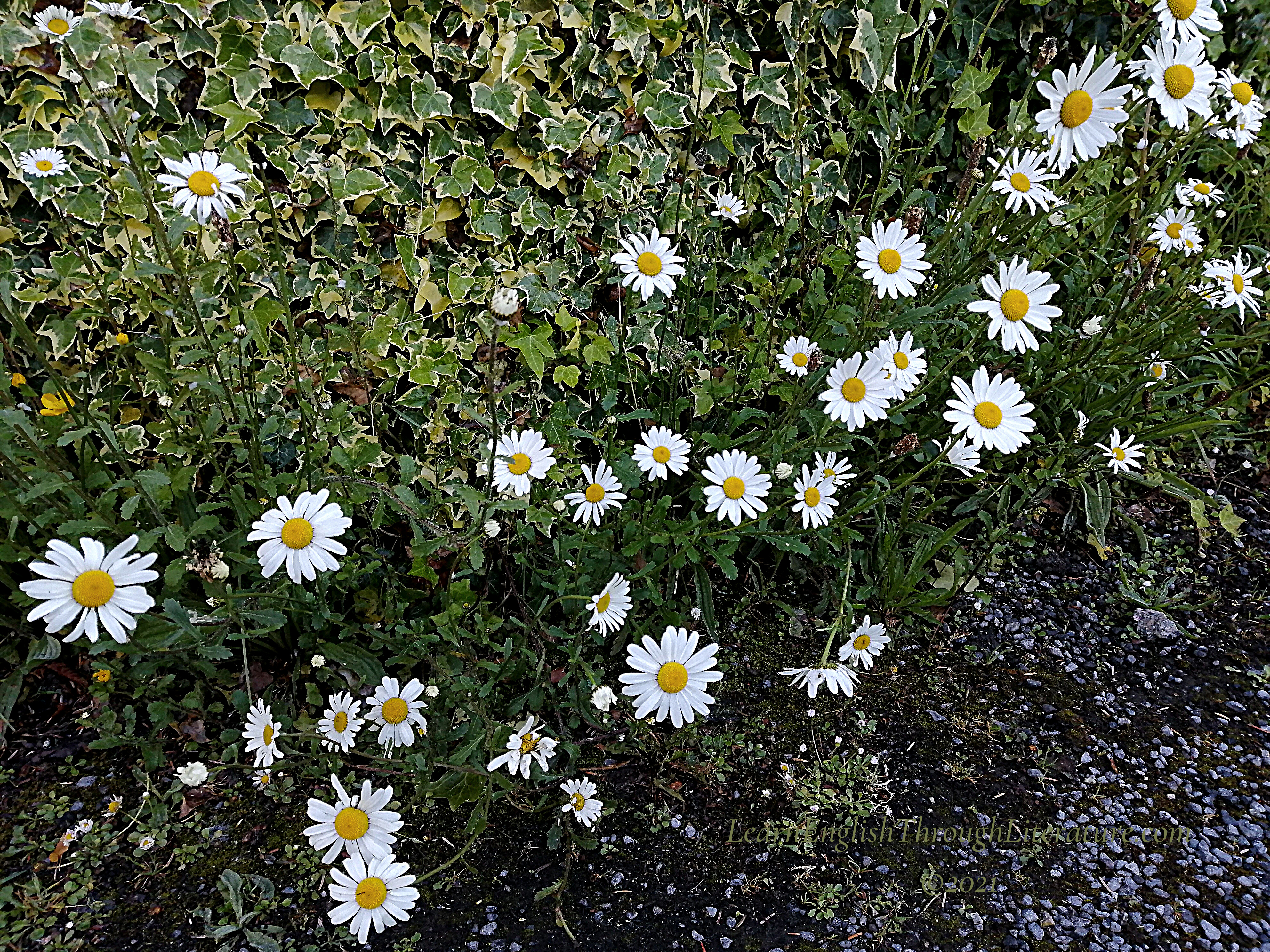A few days ago, on my early morning walk, I noticed these nice daisies that grow so plentifully by the roadside near my home. 🌼
I took a photograph of them to remember them by when they would be withered away.
I was glad that I did, because when I returned a few days later, they were gone!
To be honest, I was a little bit sad about it … 🥀
Someone had mown them down – cut them down and away from the road. ‘To mow’ is a verb we use to describe the cutting of delicate things like grass and flowers (but not the cutting of trees, which are ‘hewn’ down – from the verb ‘to hew’).
There is a poem called ‘The Mower’ (1979) by 20th-century British poet Philip Larkin, which describes this feeling of loss when a life is cut short.
It is a poem about a death and the strangeness of living after someone else – even a small animal, in this case – has died. 🦔
It ends on a sensitive note however, reminding us to ‘be kind / While there is still time’.
If you have been reading these Lessons for a while, you will remember that every second Saturday we read a poem together.
✏️ I will let this short poem mostly speak for itself today; its accompanying vocabulary list is equally short. You will find a few notes and questions below to help you reflect on it further and make the most of your reading. And lastly, here is a link to a good narration of the poem on YouTube. I think you will appreciate its simple, thoughtful verses!
…
📜 ‘THE MOWER’ (1979) BY PHILIP LARKIN
The mower stalled, twice; kneeling, I found
A hedgehog jammed up against the blades,
Killed. It had been in the long grass.
I had seen it before, and even fed it, once.
Now I had mauled its unobtrusive world
Unmendably. Burial was no help:
Next morning I got up and it did not.
The first day after a death, the new absence
Is always the same; we should be careful
Of each other, we should be kind
While there is still time.
…
📝 VOCABULARY
mower: someone or something (a machine) that mows grass
stalled: < to stall: to stop suddenly by obstruction
hedgehog: a small nocturnal mammal with spiky coat and short legs. It tends to roll itself into a spiny ball when attacked. 🦔
jammed: < to jam: to squeeze tightly into a very narrow space; to cause something to become stuck
blade: the flat cutting edge of a knife
mauled: < to maul: to wound savagely by scratching or tearing
unobtrusively: without bothering or troubling anyone; not obtruding on anyone
unmendably: that cannot be mended, fixed, or restored
burial: the act of burying or placing a dead body in a tomb or in the ground
absence: the state of something or someone being away, missing, or not present
…
📝 A FEW OBSERVATIONS
✏️ Notice how Larkin uses punctuation and line breaks in this poem to cause us to stop and reflect at important points.
The breaks they introduce (for example, ‘… a hedgehog jammed against its blades / Killed’) emphasise the cruelty of sudden death and loss.
✏️ He also begins by speaking in the first person: ‘I found … I had seen it … I had mauled …’
However, he introduces a sense of community by using the collective pronoun ‘we’ in the last three lines.
In other words, Larkin’s loss isn’t just an experience for him alone, but something that might help us as readers (included in ‘we’) to be kinder people while we have a life to live.
✏️ He ends with a sentence that highlights the two meanings of ‘careful’: it speaks of 1) being attentive and cautious so that we don’t hurt others (think of the exclamation, ‘Be careful when you cross the street!’) and also 2) its meaning of ‘being full of care’ or ‘kindness’ towards others.
…
📝 SOME REFLECTIVE QUESTIONS
Larkin describes how he recognised the hedgehog as one that he had 📜 ‘seen … before, and even fed it, once’.
Have you ever cared for a stray animal, or even owned a beloved pet? Do you have anyone in your life (such as a child) that you try to provide for and protect?
What have you done to care for them?
The hedgehog’s death affected Larkin so deeply that he turned to poetry, memorialising (preserving the memory of) the animal’s short life.
Larkin finishes with the difficult realisation that ‘life goes on’:
📜 ‘Next morning I got up and it did not.
The first day after a death, the new absence
Is always the same …’
Have you ever lived through an experience that made you more aware of the shortness of life and all you wanted to live for?
I have lived through many such experiences, hoping that I never take life for granted!
The beauty of Larkin’s poem is that it doesn’t end as a personal reflection only but as an invitation. Notice how these lines use the word ‘should’, a modal verb that strongly suggests something:
📜 ‘… we should be careful
Of each other, we should be kind
While there is still time.’
Finally, one question that I ask myself after reading this poem is ‘how can I be kind today ‘while there is still time’?’ 🌼
While acknowledging that this poem is written on a sad subject, has its sensitivity impacted you in any way?
…
✍️ If you have time, why not write a few lines (between 3-5) describing your response to this poem as a short writing exercise. If you send them to me before July 15th (you can do this through the contact form here), I will provide you with feedback and suggestions on how to improve your expression in English.




